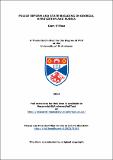Police reform and state-building in Georgia, Kyrgyzstan and Russia
Abstract
This dissertation provides an in-depth study of police transformation in Georgia,
Kyrgyzstan and Russia since the collapse of the Soviet Union. It draws upon
interviews with police, NGO workers, politicians and international practitioners,
and employs a comparative-historical approach.
Contra to democratic policing approaches, advocating the diffusion of police
power and implementation of police reform concurrently with wider
democratisation, reform was relatively successful in Georgia after the 2003 Rose
Revolution because of state-building. The new government monopolised
executive power, fired many police, recruited new personnel, raised police
salaries and clamped down on organised crime and corruption. Success also
depended on the elite’s political will and their appeal to Georgian nationalism.
Prioritisation of state-building over democratisation limited the reform’s success, however. The new police are politicised and have served elites’ private interests. Reform has failed in Kyrgyzstan because of a lack of state-building. Regional, clan
and other identities are stronger than Kyrgyz nationalism. This has hindered the
formation of an elite with capacity to implement reform. The state has limited
control over the police, who remain corrupt and involved in organised crime.
State-building has not precipitated police reform in Russia because of the
absence of political will. The ruling cohort lacks a vision of reform and relies on
corruption to balance the interests of political factions.
The contrasting patterns of police reform have a number of implications for
democratic police reform in transitioning countries: First, reform depends on
political will. Second, institutionalising the police before democratising them
may be a more effective means of acquiring the capacity to implement reform.
Third, such an approach is likely to require some sort of common bond such as
nationalism to legitimate it. Fourth, ignoring democratisation after
institutionalisation is risky as reformers can misuse their power for private interests.
Type
Thesis, PhD Doctor of Philosophy
Collections
Items in the St Andrews Research Repository are protected by copyright, with all rights reserved, unless otherwise indicated.
Related items
Showing items related by title, author, creator and subject.
-
Religious directives of health, sickness and death: Church teachings on how to be well, how to be ill, and how to die in early modern England
Elkins, Mark (University of St Andrews, 2018-12-07) - ThesisIn broad terms, this thesis is a study of what Protestant theologians in early modern England taught regarding the interdependence between physical health and spirituality. More precisely, it examines the specific and ... -
The industry of evangelism : printing for the Reformation in Martin Luther's Wittenberg
Thomas, Drew B. (University of St Andrews, 2018-06-28) - ThesisWhen Martin Luther supposedly nailed his Ninety-Five Theses in 1517 to the Castle Church door in Wittenberg, the small town had only a single printing press. By the end of the century, Wittenberg had published more books ... -
Continuity and discontinuity: the Lord's Supper in historical perspective
Sefton, Henry (St Mary's College, University of St Andrews, 2008-12-01) - Journal articleWhile the Reformation brought a transformation in the way the Lord's Supper was celebrated in Scotland, Henry Sefton's paper shows that the change in practice was not at complete as might be thought, and that through the ...

